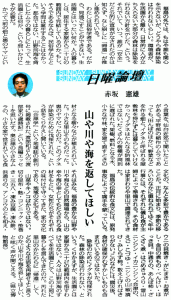Original Japanese written by staffer
The English below translated from the original Japanese by Heeday
The English translation edited by Rev. Dr. Henry French, ELCA
(Based on an article from the January 17th, 2016 edition of the Fukushima Minpo newspaper)
▼Click the image and read the caption.

On December 21st, 2015, Japan’s Ministry of the Environment determined that it would not decontaminate the forest of Fukushima some 20m (22 yards) or more apart from the nearest residence or farm. By making this decision, the Ministry rejected repeated petitions from the Fukushima Prefectural Government and municipalities for a total decontamination of the Prefecture’s forest, ignoring their claim that the forest is an essential part of the livelihood of Fukushima’s people. Mr. Norio Akasaka, director of Fukushima Museum, published a document on this issue, questioning the national government’s attitude from the viewpoint of his field of expertise, ethnology.
* Excerpt from the document – “In the suburbs of Sendai, Miyagi Pref., I once heard the phrase, ‘the front farm and the forest behind.’ Even in a rice-growing village located on a field, each farming household had to have two things in addition to their rice fields –vegetable fields, and their homestead woodland, named ‘igune,’ to make their living. This igune was not just a wind-break forest. They carefully chose and planted many different species of trees. Some bore fruit. Some provided fuel. Some provided short bamboo. Other trees provided the wood required when rebuilding the house. In short, igune was little ‘satoyama,’ the forest that was part of the community, the forest that was the ‘forest behind.’ I heard over and over again that the decontamination work has cut down such igune.
This reminds me of a long essay titled ‘Watanabe-ke no Saijiki (Seasons of the Watanabes)’ by Ms. Kazu Watanabe, contained in the first issue of a local publication named ‘Aizu Gaku (Studies of Aizu).’ (Translator’s note: Aizu is a region in the western part of Fukushima.) It described all the wealth of the culinary culture of the small families living in a small village deep in Aizu. The village celebrates many annual events, beginning with the New Year, and each event has its own ceremonial meal, prepared by the head woman of the household. The meal’s ingredients are all collected from nature and ‘satoyama’ surrounding each household.
The nuclear power plant meltdown has seriously hurt Fukushima’s traditional culinary culture. Here, each family and district have developed their own culinary culture. Fukushima’s women have created their own recipes thanks to the blessed ingredients from the abundance of mountains, fields, rivers, and ocean. To them, their livelihood is not limited to the radius of 20m from their houses. All the mountains, fields, rivers, and ocean surrounding them are necessary for their livelihood. If their forest is not decontaminated, what kind of a living can they make, if and after they return to their hometowns? I can hear their voices saying, ‘Give us back our mountains, rivers, and ocean!’”
The lifestyles and culture that people have built up over millennia are now on the verge of extinction, thanks to the nuclear power plant (NPP) built only some four decades ago. A NPP destroys what people need to live as people. No decontamination or compensation can ever restore such lifestyles and culture once they are lost.
Many people have a cherished environment and culture which are native to them, that they grew up with. And this cherished culture-nature complex is often a part of their psyche. I believe we should not let the national government force the refugees to return to their hometowns, if such a return is a national policy that ignores people’s right to live as people.
